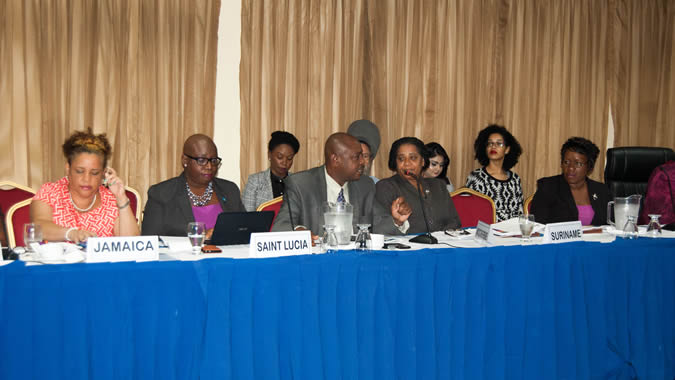Senior Government Officials Call for Greater Autonomy and Gender Equality across the Caribbean
Work area(s)
The Caribbean preparatory meeting of the XIII Regional Conference on Women in Latin America and the Caribbean takes place on 26-27 July 2016 in Port of Spain, Trinidad and Tobago.

High-level government officials and senior international gender experts are calling for more to be done to ensure the economic and social autonomy of Caribbean women. Within the context of the 2030 Agenda for Sustainable Development, the opportunities and challenges faced by women as against men in such areas as employment, education, human rights and political leadership speak to the issues of equality which are at the heart of discussions being held at the Caribbean preparatory meeting of the XIII Regional Conference on Women in Latin America and the Caribbean, taking place on 26-27 July 2016 in Port of Spain, Trinidad and Tobago.
“Too often gender relations are thrust into the spotlight only when we have to deal with gruesome news. If we have been thinking about these problems for over forty years, then how do we account for the progress gap? We must fully appreciate that while we have made significant strides, the global construct has not led us to a new way of thinking” underscored Gale T.C. Rigobert, Minister for Education, Innovation, Gender Relations and Sustainable Development of Saint Lucia. These views expressed during her panel presentation echoed opening remarks delivered by Diane Quarless, Director of the Economic Commission for Latin America and the Caribbean (ECLAC) subregional headquarters for the Caribbean, who highlighted that “the question of access to credit and the right to own land, the question of access to labour markets, the question of psycho-social barriers, and the question of equal access to productive resources are just some of the issues that we need to address. We must ensure that the 2030 Agenda meets the gender needs of our region. This is our ultimate objective.”
Notwithstanding ongoing efforts of Caribbean countries to close the equality gap between men and women, notable differences persist across the subregion as women continue to experience the highest incidence of poverty and unemployment. The reasons for this persistent lack of economic autonomy are clear: there is lower female participation in paid work; lower wages compared to male counterparts; and the resultant lower levels of social security benefits. It is precisely in this context that Jennifer Rouse, Director of the Division of Ageing, Ministry of People and Social Development of Trinidad and Tobago emphasized that “when we talk about support, women are labelled as the de facto care givers. However, in the Caribbean the older population is predominantly female. We have the largest proportion of single poor women in the world. As a result, in our region it is the elderly who are taking care of the elderly.”
It is expected that this situation will improve over the next 15 years as Caribbean countries implement the Sustainable Development Goals (SDGs). With women’s economic and social empowerment considered not only a key factor in achieving gender equality but also a prerequisite for sustainable development, Caribbean experts and government officials concur that pursuing the 2030 Agenda for Sustainable Development will provide real opportunities for advancing gender equality in the subregion.
Seizing this unique opportunity is the crucial objective of this year’s Caribbean preparatory meeting of the XIII Regional Conference on Women in Latin America and the Caribbean, which provides a forum to examine critical issues that need to be addressed if gender equality and women’s economic autonomy are to be achieved across the subregion by 2030.
The Caribbean contribution will serve to broaden the perspectives expressed at the XIII Regional Conference, which will take place later this year in Montevideo, Uruguay, on 25-28 October. The Regional Conference on Women in Latin America and the Caribbean is a subsidiary organ of ECLAC. The Conference is convened on a regular basis in order to identify the needs of women at the regional and subregional levels; to carry out periodic reviews of activities that comply with regional and international agreements, and to put forward recommendations for the national Governments of the region. The last session of the Conference was held in the Dominican Republic two years ago.
This Caribbean consultation is the third and final subregional meeting convened in preparation for the XIII Conference, the other two having been held in Mexico City and Santiago de Chile, on 2-3 June and 4-5 July 2016, respectively.
Related content
Preparatory meeting of the XIII Regional Conference on Women in Latin America and the Caribbean with Caribbean countries
The preparatory meeting of the XIII Regional Conference on Women in Latin America and the Caribbean with Caribbean countries is convened In accordance with the agreement of the fifthly-third meeting…

Subregional headquarter(s) and office(s)
Type
Country(ies)
- Latin America and the Caribbean
- Caribbean
Contact
Public Information Unit
- prensa@cepal.org
- (56 2) 2210 2040
